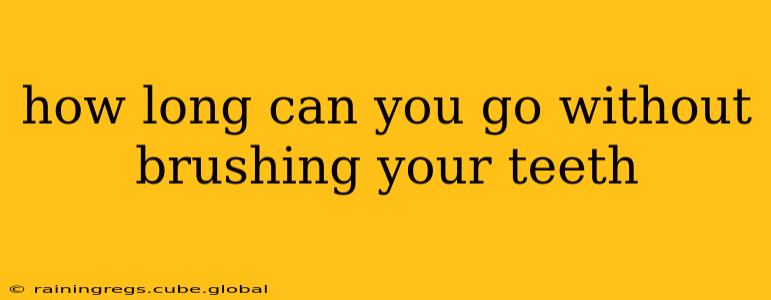Maintaining good oral hygiene is crucial for overall health. But how long can you realistically go without brushing your teeth before experiencing negative consequences? The answer isn't a simple number of days, but rather a complex interplay of individual factors and potential risks. Let's delve into the effects of neglecting your oral care routine.
What Happens When You Don't Brush Your Teeth?
The moment you stop brushing your teeth, the bacteria naturally present in your mouth begin to feast on food particles left behind. This process leads to the formation of plaque, a sticky film that clings to your teeth. Plaque contains acids that erode tooth enamel, the protective outer layer of your teeth. This erosion can lead to cavities (dental caries), increased sensitivity, and ultimately, tooth decay.
Furthermore, neglecting brushing allows bacteria to multiply and thrive, contributing to gum inflammation (gingivitis). Gingivitis, if left untreated, can progress to periodontitis, a severe gum disease that damages the soft tissues and bone supporting your teeth. Periodontitis can lead to tooth loss, and has even been linked to serious health problems like heart disease and stroke. Bad breath (halitosis) is another immediate and unpleasant consequence of skipping brushing.
How Long Before Serious Problems Arise?
There's no magic number of days before serious dental problems emerge. The timeline varies greatly depending on factors such as:
- Your individual oral hygiene habits: Even with occasional lapses, someone with generally good oral hygiene might experience fewer and less severe problems than someone with consistently poor habits.
- Your diet: A diet high in sugary or acidic foods accelerates plaque formation and enamel erosion.
- Your genetics: Some individuals are naturally more prone to gum disease or cavities.
- Your overall health: Underlying health conditions can influence your susceptibility to oral problems.
While some might see minor symptoms like bad breath within a day or two, significant problems like cavities or gum disease typically develop over weeks or months of consistent neglect.
How Often Should You Brush Your Teeth?
The American Dental Association (ADA) recommends brushing your teeth twice a day for two minutes each time, using fluoride toothpaste. This is the most effective way to remove plaque and prevent the build-up of harmful bacteria.
What About Flossing?
Brushing alone isn't enough to maintain optimal oral hygiene. Flossing is essential for removing food particles and plaque from between your teeth and along the gum line, areas where your toothbrush can't reach. Flossing at least once a day is crucial for preventing gum disease.
What Happens If You Only Brush Once a Day?
While brushing twice daily is ideal, brushing once a day is still better than not brushing at all. However, it's important to be consistent and to brush thoroughly to minimize the risk of dental problems.
Can Mouthwash Replace Brushing?
Mouthwash can complement brushing and flossing but should never replace them. Mouthwash helps kill bacteria and freshen breath but doesn't remove plaque effectively.
Conclusion: Prioritize Oral Hygiene
Ultimately, the best approach is to prioritize regular brushing and flossing. While the exact time it takes for negative consequences to appear varies, consistent neglect will inevitably lead to oral health issues. Schedule regular check-ups with your dentist for professional cleanings and early detection of any problems. Prevention is always better than cure when it comes to maintaining a healthy smile.
